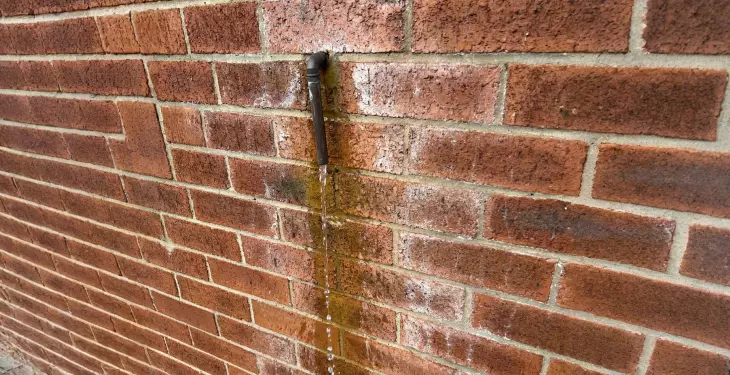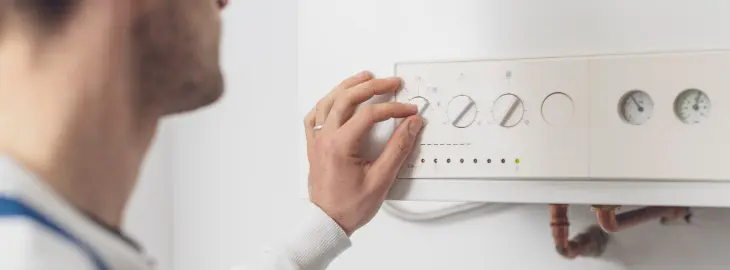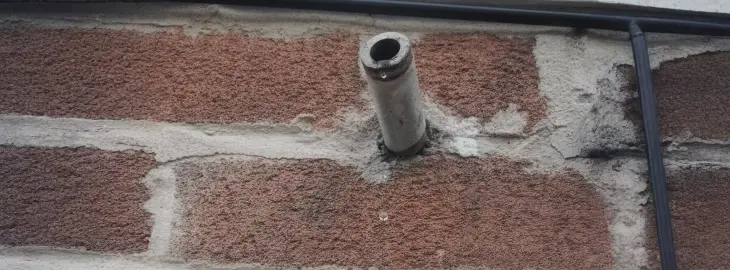

Written by Stephen Day
Gas Safe Engineer
Updated: 5th December, 2025
A leaking overflow pipe is usually caused by high boiler pressure or a faulty valve.
Get a new boiler quote, save up to £550 per year (0% APR available).
An overflow pipe leaking outside the house is a sign that your heating system is trying to protect itself. Most leaks come from:
High boiler pressure
A faulty pressure relief valve
A stuck filling loop letting water in
A faulty expansion vessel
A fault with the loft tank in an open vented system
Below is a clear look at each cause and what you can do next.
If the pressure gauge rises too high, the system pushes excess water out through the overflow pipe.
The pressure gauge reads over 2.5 bar when the heating is on.
Pressure rises quickly every time the heating starts.
Look at your boiler’s pressure gauge when the system is cold. It should sit around 1 to 1.5 bar.
If it is higher, you can release a small amount of water from a radiator using a bleed key.
If pressure rises again within hours or days, there is an underlying fault that needs professional repair.
The pressure relief valve (PRV) releases water when pressure becomes too high.
If the valve is worn or stuck slightly open, water can leak constantly from the overflow pipe.
A steady drip from the overflow even when pressure is normal.
The PRV discharge pipe outside is warm.
A faulty PRV needs repairing or replacing by a Gas Safe engineer. This should not be attempted yourself.
The filling loop is used to top up the system. If the taps or check valves are stuck open, water may enter the system all the time, pushing pressure too high.
Pressure keeps rising after you top up the boiler.
You hear water trickling into the system even when not in use.
Make sure both filling loop taps are fully closed.
If pressure still climbs, the filling loop valves may need replacing.
The expansion vessel absorbs changes in water pressure when the system heats up.
If it is flat or waterlogged, pressure will rise sharply and push water out of the overflow pipe.
Pressure rises quickly during heating cycles.
Pressure drops back to zero or very low when the system cools.
An expansion vessel needs recharging or replacing by a qualified engineer.
Older heating systems have a tank in the loft that can spill water through the overflow pipe.
This is often caused by a stuck float or a faulty ball valve.
Water dripping from the high level overflow pipe outside.
Loft tank visibly higher than normal.
Only observe the tank. Do not adjust the float or ball valve yourself.
A professional can replace the valve or float and check the heating system for related issues.
A small drip is usually not an emergency.
However, constant leaking, rapidly rising pressure or any hissing or steam from the boiler can indicate a safety issue.
Turn the heating off and call a Gas Safe engineer if you notice any of these warning signs.
These checks are simple and safe for most homeowners:

Cold pressure should be around 1 to 1.5 bar.

Both taps must be fully turned off.

Do this only if you are comfortable using a radiator key.

This helps identify whether the leak is continuous or linked to heating cycles.
If pressure continues to rise after these checks, stop troubleshooting and get an engineer involved.
Problem | Common Signs | Safe Action | Engineer Required |
|---|---|---|---|
High pressure | Gauge above 2.5 bar | Bleed radiator | If leak returns |
Faulty PRV | Constant dripping | None | Yes |
Filling loop stuck | Pressure keeps rising | Close taps | If still rising |
Expansion vessel fault | Fast pressure swings | None | Yes |
Loft tank issue | Overflow from high pipe | Observe only | Yes |
Repairs usually cost between sixty and one hundred eighty pounds, depending on the cause, parts needed and the type of system you have.
Check boiler pressure every few weeks
Do not overfill the system
Bleed radiators before winter
Have the boiler serviced annually
Replace faulty valves promptly
Regular servicing helps reduce sudden pressure problems and keeps the heating system working efficiently.
A leaking overflow pipe usually means your boiler is relieving pressure or a valve needs attention.
Simple checks can help, but lasting issues need professional repair to keep the system safe.
If your boiler is struggling to hold pressure or the overflow problem is linked to an older heating system, iHeat installs modern and efficient boilers from trusted brands.
You can get a free online quote along with helpful guidance tailored to your home.
Last updated: 5th December, 2025

Written by Stephen Day
Gas Safe Engineer at iHeat
Stephen Day is a Gas Safe registered and FGAS certified engineer with over 20 years of hands-on experience in the heating, cooling, and renewable energy industry, specialising in boiler installations, air conditioning, and heat pump systems.
LinkedInArticles by Stephen Day are reviewed by iHeat’s technical team to ensure accuracy and reliability.

27th February, 2026
Condensing boilers are considered to be some of the most efficient boilers out there on th...
 Read Article
Read Article

26th February, 2026
Vaillant boilers use a variety of parts to ensure efficient operation. This section looks...
 Read Article
Read Article

26th February, 2026
Leaving the heating on low all day might seem like a way to avoid the chill without bursti...
 Read Article
Read Article
No obligation. Takes less than 60 seconds.